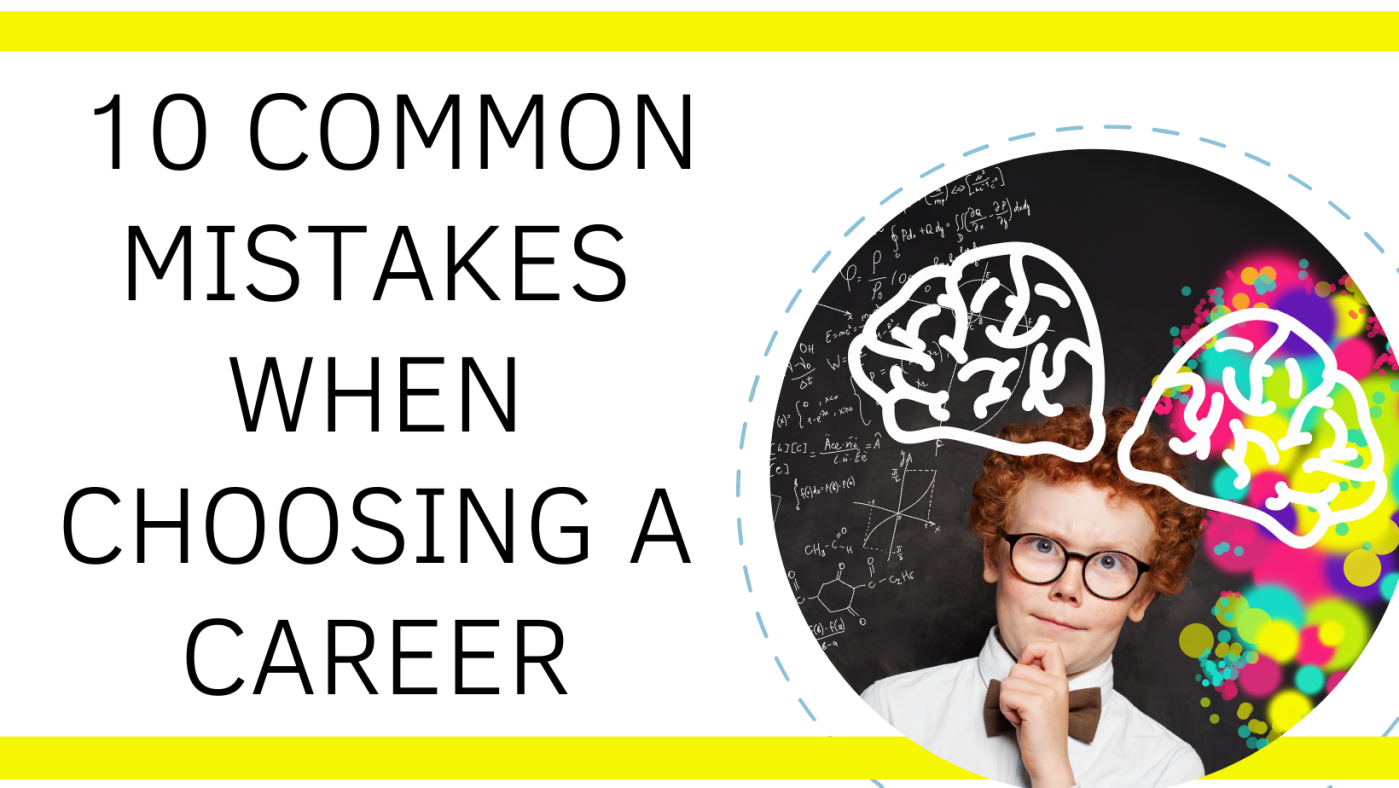Expert Advice on How to Make the Right Career Choice for You
Choosing the right career can be a daunting task, and it’s easy to make mistakes along the way. Whether you’re a recent graduate, changing careers, or just unsure of what you want to do with your life, it’s important to avoid common missteps that can derail your career before it even gets started.
In this post, we’ll take a look at 10 common mistakes people make when choosing a career, and offer expert advice on how to avoid them. From not considering your values and interests to succumbing to peer pressure, we’ll cover everything you need to know to make the right career choice for you.
Here are the 10 common mistakes people make when choosing a career:
- Not considering your values and interests
- Choosing a career based on prestige or money
- Not researching the job market
- Not exploring all your options
- Succumbing to peer pressure or family expectations
- Not seeking out career guidance or advice
- Being too focused on short-term goals
- Ignoring the importance of work-life balance
- Failing to assess your skills and strengths
- Not taking risks and stepping out of your comfort zone

- Choosing a career based solely on salary: While it’s important to consider salary, choosing a career solely based on this factor can lead to job dissatisfaction and burnout. According to a study by the Society for Human Resource Management (SHRM), employees who are dissatisfied with their salaries are more likely to experience burnout and feel disengaged at work.
- Not considering personal interests and passions: Pursuing a career solely for financial gain or societal pressure can lead to a lack of fulfilment and job dissatisfaction. In his book “What Colour is Your Parachute?”, Richard N. Bolles emphasizes the importance of considering one’s interests and passions when choosing a career path.
- Focusing too much on job titles: Job titles can be deceiving and do not always accurately reflect the job responsibilities or opportunities for growth within a company. The book “Designing Your Life” by Bill Burnett and Dave Evans emphasizes the importance of focusing on job responsibilities and day-to-day tasks, rather than job titles.
- Not researching the industry or company: It’s important to research the industry and company before accepting a job offer. This can help to ensure that the company’s values and work culture align with personal values and goals. The book “The 2-Hour Job Search” by Steve Dalton provides a step-by-step guide to researching companies and industries.

- Ignoring the job market: Choosing a career without considering the job market can lead to difficulties finding employment or job instability. The book “The Pathfinder” by Nicholas Lore emphasizes the importance of considering the job market and identifying in-demand skills and industries.
- Not seeking career guidance: Seeking career guidance from professionals or mentors can provide valuable insights and help to identify strengths and weaknesses. The American Counselling Association offers career counselling services, and the website CareerOneStop provides resources for finding career counselling in the U.S.

- Choosing a career based on the expectations of others: Succumbing to societal or familial pressure can lead to a lack of fulfilment and job dissatisfaction. In the book “The Art of Work”, Jeff Goins emphasizes the importance of choosing a career based on personal values and goals, rather than the expectations of others.
- Overlooking work-life balance: Ignoring work-life balance can lead to burnout and a lack of satisfaction in personal and professional life. The book “Essentialism” by Greg McKeown emphasizes the importance of prioritizing and focusing on the most important tasks, rather than trying to do everything.
- Not considering education and training requirements: Ignoring education and training requirements can lead to difficulties finding employment or job instability. The website MyNextMove provides information on education and training requirements for various careers.
- Lack of flexibility and adaptability: Refusing to adapt to changes in the job market or industry can lead to difficulties finding employment or job instability. The book “What Got You Here Won’t Get You There” by Marshall Goldsmith emphasizes the importance of adapting

In conclusion, choosing a career is a significant decision that can shape the rest of your life. To avoid common mistakes and make a well-informed decision, it’s crucial to take the time to assess your interests, skills, and values, research different career options, and seek advice from professionals and mentors. Remember that it’s okay to change paths if you’re not satisfied with your initial choice and that personal growth and fulfilment should be the ultimate goal. By avoiding the ten mistakes we’ve covered in this article, you’ll be one step closer to finding a career that suits you and leads to a successful and satisfying life.
Thank you for taking the time to read this article on the top 10 mistakes to avoid when choosing a career. We hope that you found it informative and useful in your own career journey. Our blog is dedicated to providing valuable insights, advice, and resources to help you achieve your career goals. By following our blog, you’ll stay up-to-date on the latest trends in the job market, gain valuable insights from industry experts, and receive practical tips to help you succeed in your career. So be sure to hit that “subscribe” button to join our community of career-driven individuals and take your first step towards achieving your dream career.
#careeradvice #careerplanning #careerdevelopment #careerchoices #careerpath #careergoals #jobsearch #jobhunt #jobtips #jobseekers #employment #workplace #professionaldevelopment #careertransition #careeradvancement #careerchange #careeradvice101 #jobmarket #jobadvice

